In the UK, the busy Dartford Tunnel has benefited from the use of powerful pumping technology during improvements intended to boost traffic flow. Pump hire specialist, Sykes Pumps, helped by providing a pumping system, so as to enable piling for the conversion programme to a fully-electronic payment infrastructure.
July 28, 2015
Read time: 2 mins
RSSIn the UK, the busy Dartford Tunnel has benefited from the use of powerful pumping technology during improvements intended to boost traffic flow. Pump hire specialist, 8165 Sykes Pumps, helped by providing a pumping system, so as to enable piling for the conversion programme to a fully-electronic payment infrastructure.
Providing a route across the River Thames linking Dartford in Kent with Thurrock in Essex, the Dartford Crossing forms part of the M25 Motorway and comprises two tunnels and a bridge. High traffic volumes have led to increased congestion at the toll booths over the past few years, leading to the2309 Highways Agency’s decision to introduce a fully-electronic payment system, which requires remote payment online, by phone, via a payzone retail outlet, or by post.
The upgrade to the payment system necessitated significant changes to the infrastructure at the entrance to each of the tunnels and contractor, Jackson Civil Engineering, needed to carry out piling works to install new traffic management barriers. As the site is so close to the river, Jackson anticipated rising water when each pile was removed and brought in Sykes pumps to specify a pumping system that would remove any excess water prior to the concrete pour.
Sykes Pumps provided two GP 100M diesel pumps along with hoses and a settlement tank to create a flexible water attenuation system. The specified system disposed of low levels of nuisance water at the piles, using a duty pump. Where piling work saw larger volumes of water, the standby pump was deployed and the water was transported 400m via hoses to the settlement tank, where sediment was removed before the water was released into the sewer system.
Providing a route across the River Thames linking Dartford in Kent with Thurrock in Essex, the Dartford Crossing forms part of the M25 Motorway and comprises two tunnels and a bridge. High traffic volumes have led to increased congestion at the toll booths over the past few years, leading to the
The upgrade to the payment system necessitated significant changes to the infrastructure at the entrance to each of the tunnels and contractor, Jackson Civil Engineering, needed to carry out piling works to install new traffic management barriers. As the site is so close to the river, Jackson anticipated rising water when each pile was removed and brought in Sykes pumps to specify a pumping system that would remove any excess water prior to the concrete pour.
Sykes Pumps provided two GP 100M diesel pumps along with hoses and a settlement tank to create a flexible water attenuation system. The specified system disposed of low levels of nuisance water at the piles, using a duty pump. Where piling work saw larger volumes of water, the standby pump was deployed and the water was transported 400m via hoses to the settlement tank, where sediment was removed before the water was released into the sewer system.









